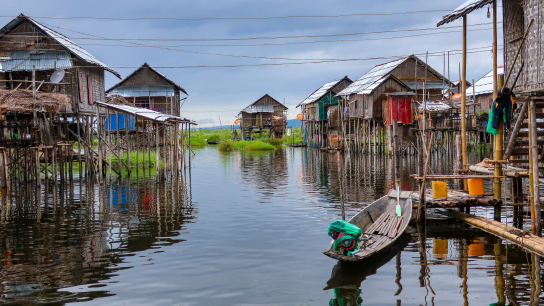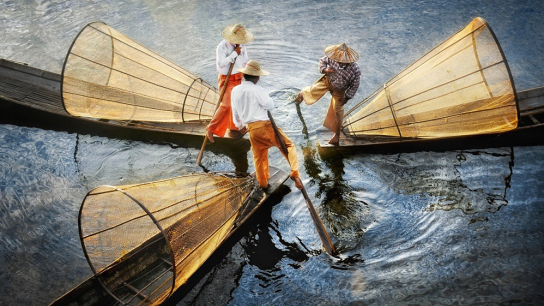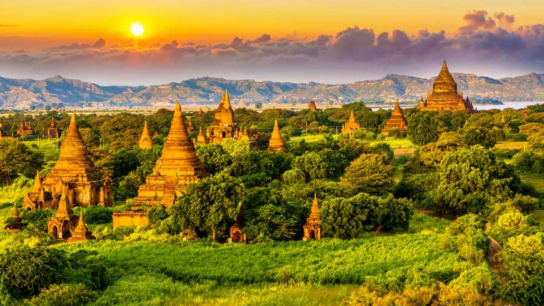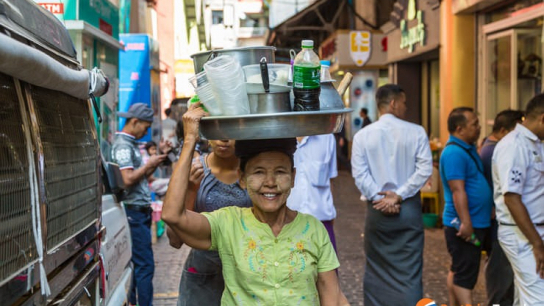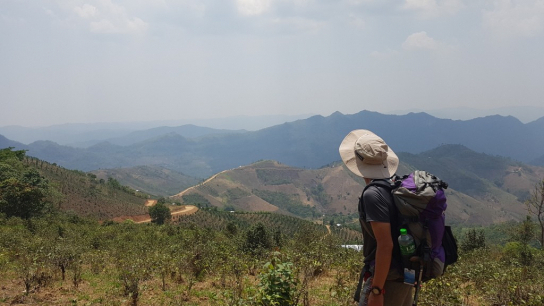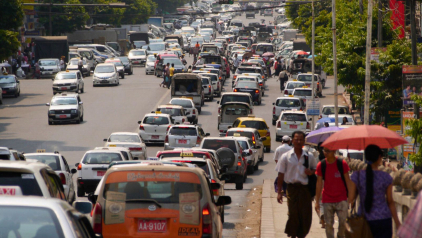A Guide To Plan Your Trip To Myanmar
If you are lucky enough to be planning a trip to Myanmar, formerly known as Burma, then you are very lucky indeed. This is a country rich in culture, history, sacred sights, scenic wonders, and personality. You will surely enjoy your travels to this region.
Myanmar (Burma) may be one of the poorest and least developed countries in Southeast Asia, but it has quickly become a sought-after tourist destination - especially since everyone is curious to find out firsthand what the formerly closed-off nation looks like. If you are planning to visit Myanmar, there are a few things that you should know in order to prepare a better trip.
Weather and When To Go To Myanmar
Although it is a year-round destination, the best time to have a holiday in Myanmar is the cool season (October to February) when the temperatures are more moderate and there is little or no rain. Myanmar can become extremely busy during this time, so plan your visit well in advance.
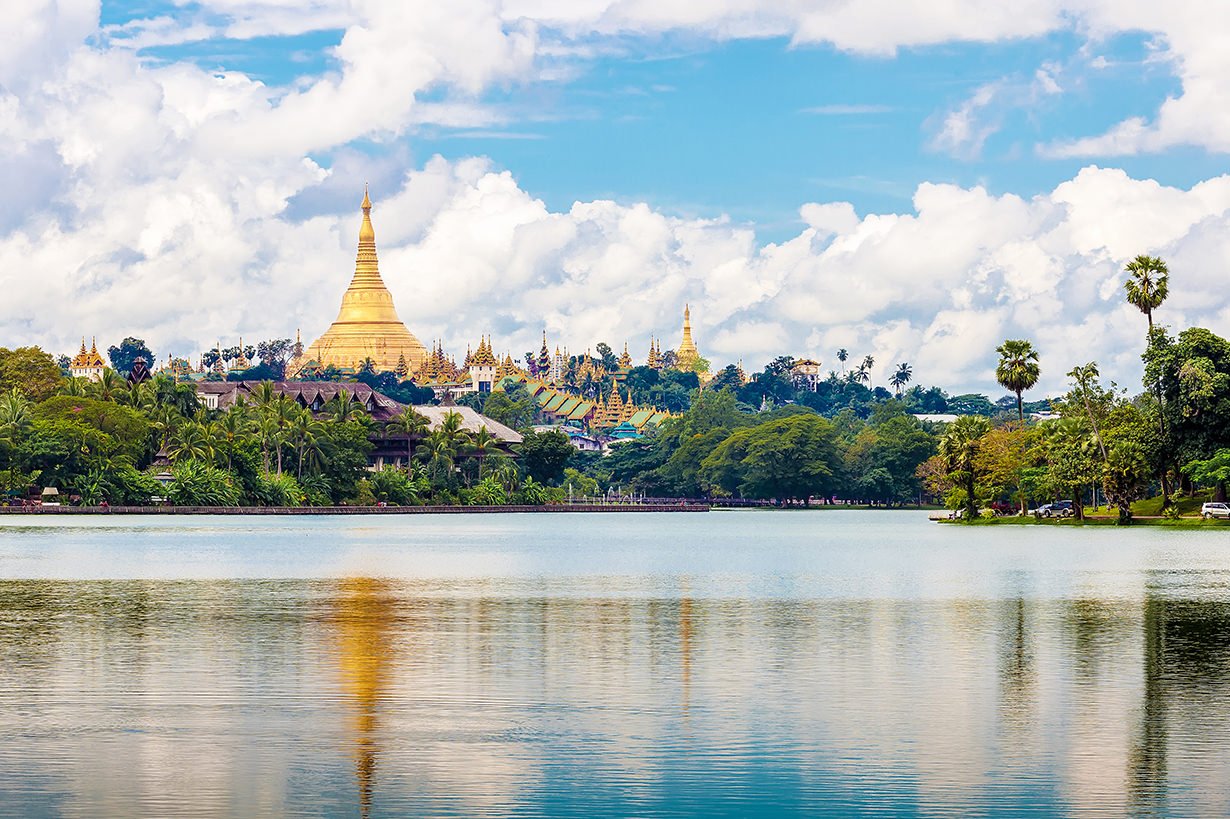
Good weather in Yangon
Visiting Myanmar during the hot or wet season has the benefit of fewer tourists and therefore lower prices. The wet season brings brief but heavy showers, mainly in the afternoon, which rarely affect tourists and brings Myanmar’s lush landscapes to life.
As you would expect, the temperatures throughout the country are greatly affected by altitude, and therefore the hill stations, lakes, and Himalayan foothills are far cooler than southern lowland and coastal regions.
As a general rule, the north, upper center, and eastern regions are at a higher altitude than those in the west, lower center, and south where humidity is higher and temperatures in excess of 40°C are not uncommon during March and April. Throughout the country, in the hottest months of the year is often advisable to have a jumper or fleece for the evenings, when there is a tendency for it to get quite cool.
Myanmar experiences monsoons and wild storms from May until early October. Heavy rains tend to occur in the afternoons and evenings, and flooding and landslides cut off many regions. Coastal resorts may be inaccessible during this time, and some – including Ngapali Beach – will close completely. River cruising may also be difficult to join in this period. Conversely, the months of March until May leading up to the rainy season are the hottest, with temperatures soaring to over 40°C. Combined with the high humidity, this is not the best time to visit Myanmar, as it makes traveling thoroughly unpleasant. If you are planning a last-minute holiday, be aware that the peak months of November to February are the busiest, and flights and accommodation are likely to be booked up far in advance. Myanmar’s tourism industry is still new, so there are still not quite enough beds during busy periods. Avoid tight schedules; internal flights may seem like an efficient alternative to potholed roads, but schedules can change without warning, so leave plenty of time if flying back to Yangon for your return flight home.
Top Destinations to Visit in Myanmar
1. Bagan
In the country of Myanmar, the main tourist destination is Bagan City. This is one of the richest archaeological sites in Southeast Asia. Its highlights can be summed up in a word: temples. Scattered across the plain in a bend of the Irrawaddy River are the ruins of thousands of temples, shrines, monasteries, and stupas.
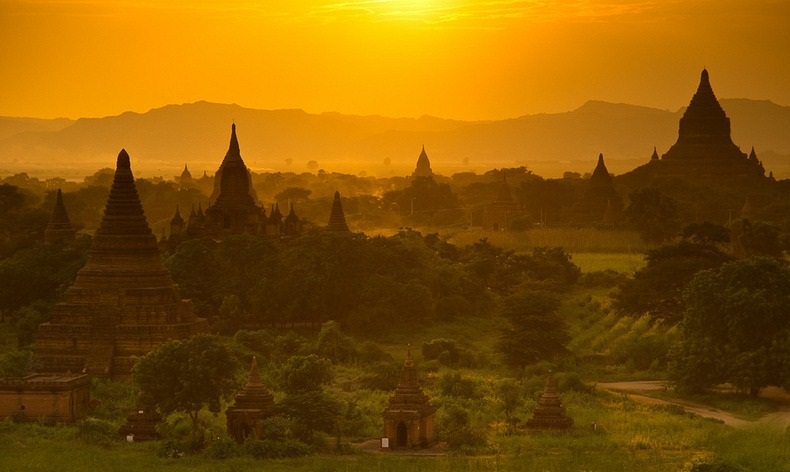
Thousands of temples, shrines, monasteries, and stupas in a small area give Bagan a mystical charm
It is possible to see all these in Bagan at any time of the year. Unlike cities in the lower part of Myanmar, Bagan does not experience a rainy season and it is hot and humid all the time. You could spend as long time as you choose to explore the area. The easiest way to go and check them out is by bike. One day is enough to see the biggest temples and some of the small ones and see the sunset. If you have a lot of time in Myanmar and do not want to rush things, just stay for a few days.
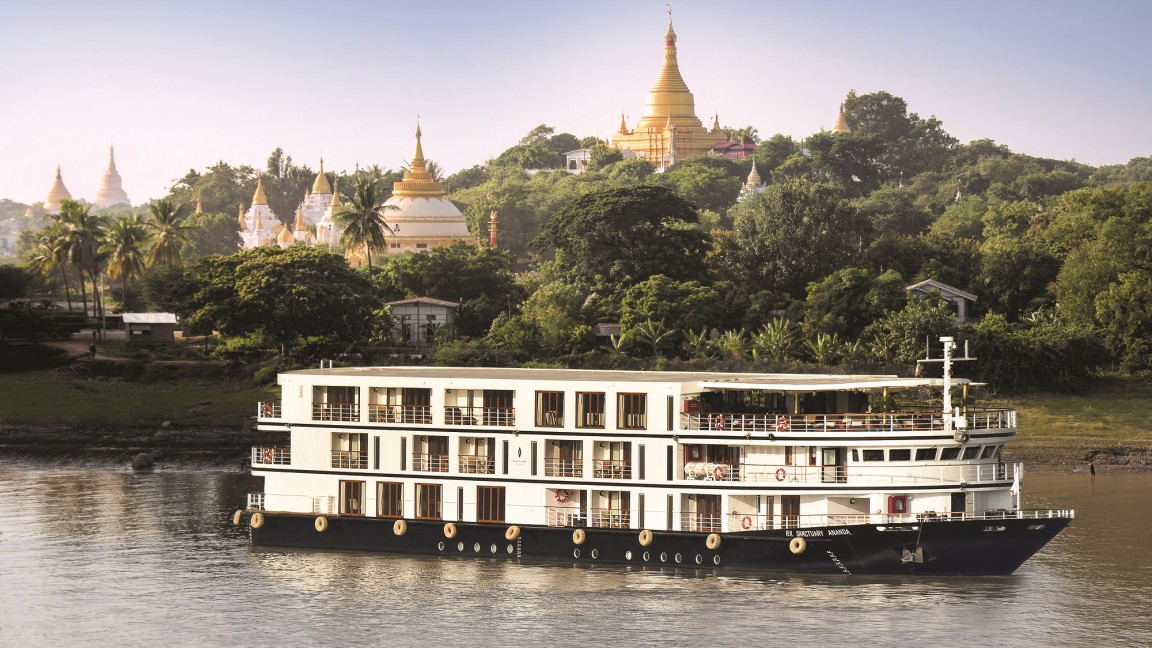
River cruise on the Irrawaddy River
One of the best things to do in Myanmar is to go on a river cruise but they are diverse, particularly in terms of the routes and the river. Bagan is a crucial stop on any river cruise. This is especially true for expeditions on the Irrawaddy and Chindwin rivers. Between Mandalay and Bagan, visitors can take in the natural beauty of Irrawaddy, the pleasant scenery, and the lifestyle of locals. Day trips are available by express boats while cruise liners such as Sanctuary Ananda Cruise, RV Paukan, etc. operate overnight trips on 2 nights, 3 nights, or 4 nights respectively.
2. Mandalay
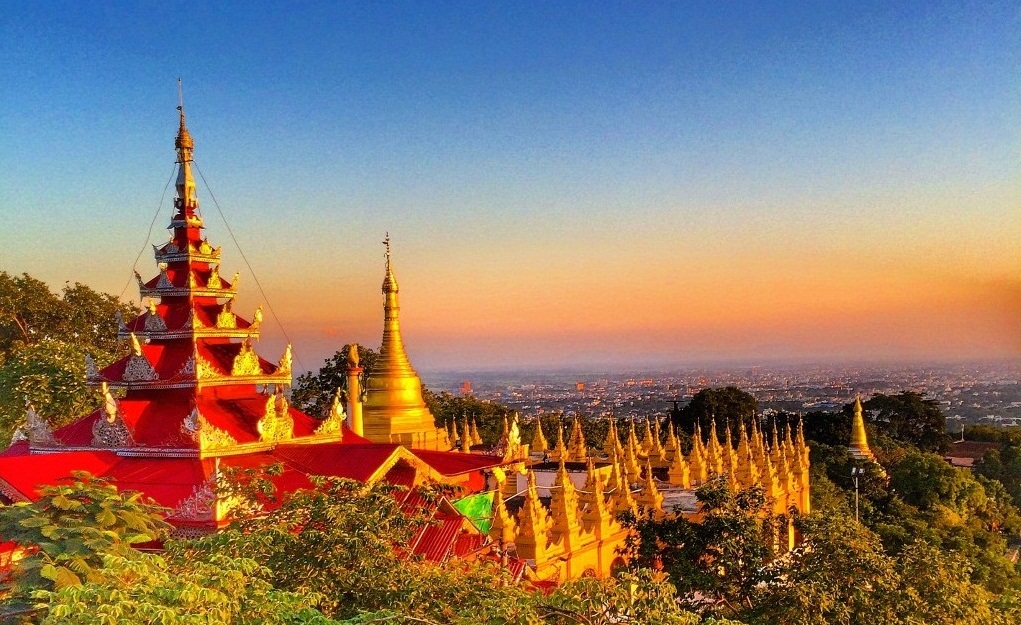
Mandalay Hill
No Myanmar tour would be perfect without exploring Mandalay. Being the last royal capital of Burma, Mandalay is considered the heartland of Burmese culture, also a bustling commercial center of the country. Mandalay is a vibrant mix of colonial British architecture, ancient Buddhist temples, and modern constructions. Like other cities in Myanmar, Mandalay is home to many pagodas, as Theravada Buddhism is the predominant religion in the country. But the most impressive thing here is that the spirit of Buddhism is everywhere without visiting temples. The images of Buddha and their red robes scatter on the streets. You will be pleasantly surprised about the number of things to do in Mandalay. Besides, around Mandalay are the remains of the ancient cities Amarapura, Sagaing, Innwa, and Mingun with a great number of interesting sites and monuments for a day-trip. Remember, as most of the sights in the city are thriving centers of Buddhist worship, it is best to dress conservatively in keeping with local traditions of modesty.
3. Yangon
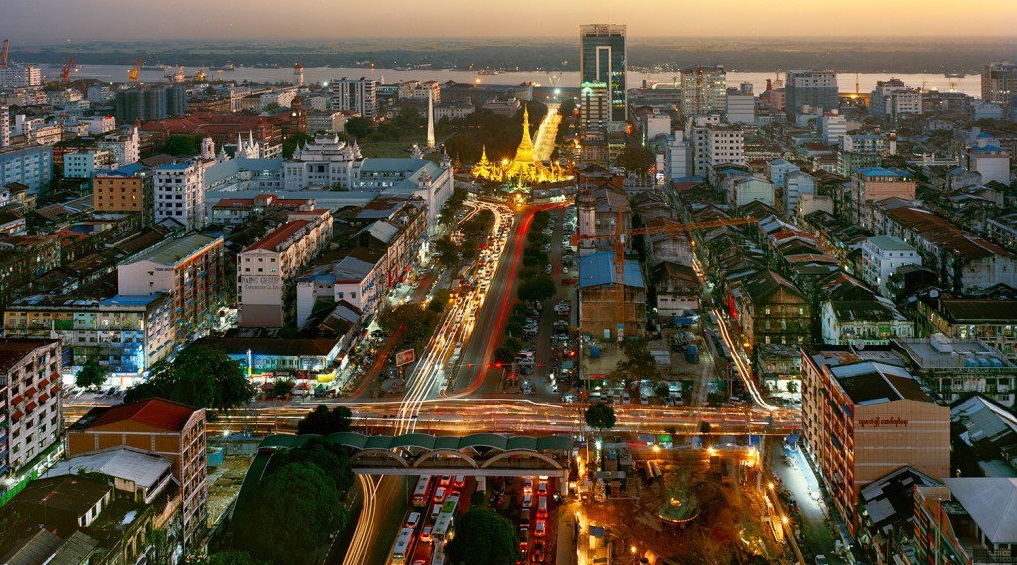
Yangon is the most vibrant city in Myanmar
Most travelers to Myanmar make Yangon their first stop. Yangon is the largest city and the most vibrant in Myanmar. In many ways, it is an amazing place to visit and you can easily spend a week or more exploring the city at a leisurely pace. It has the cosmopolitan feel of a big city but still remains a peaceful and relaxed pace of life. The city boasts a beautiful blend of culture and landscapes. From Indian streets to exotic China town and styled Burmese township, as well as the magnificent Shwedagon, lively markets, tranquil lakes, and numerous monasteries,...To receive a rare insight into the cultural and political history of this city, opt for a half-day or full-day tour as your tour guide will share deep knowledge about the history of Myanmar and Yangon. One reason you will love Yangon is how safe it is, as the strong Buddhist influence and strict laws keep everything in order.
4. Inle Lake
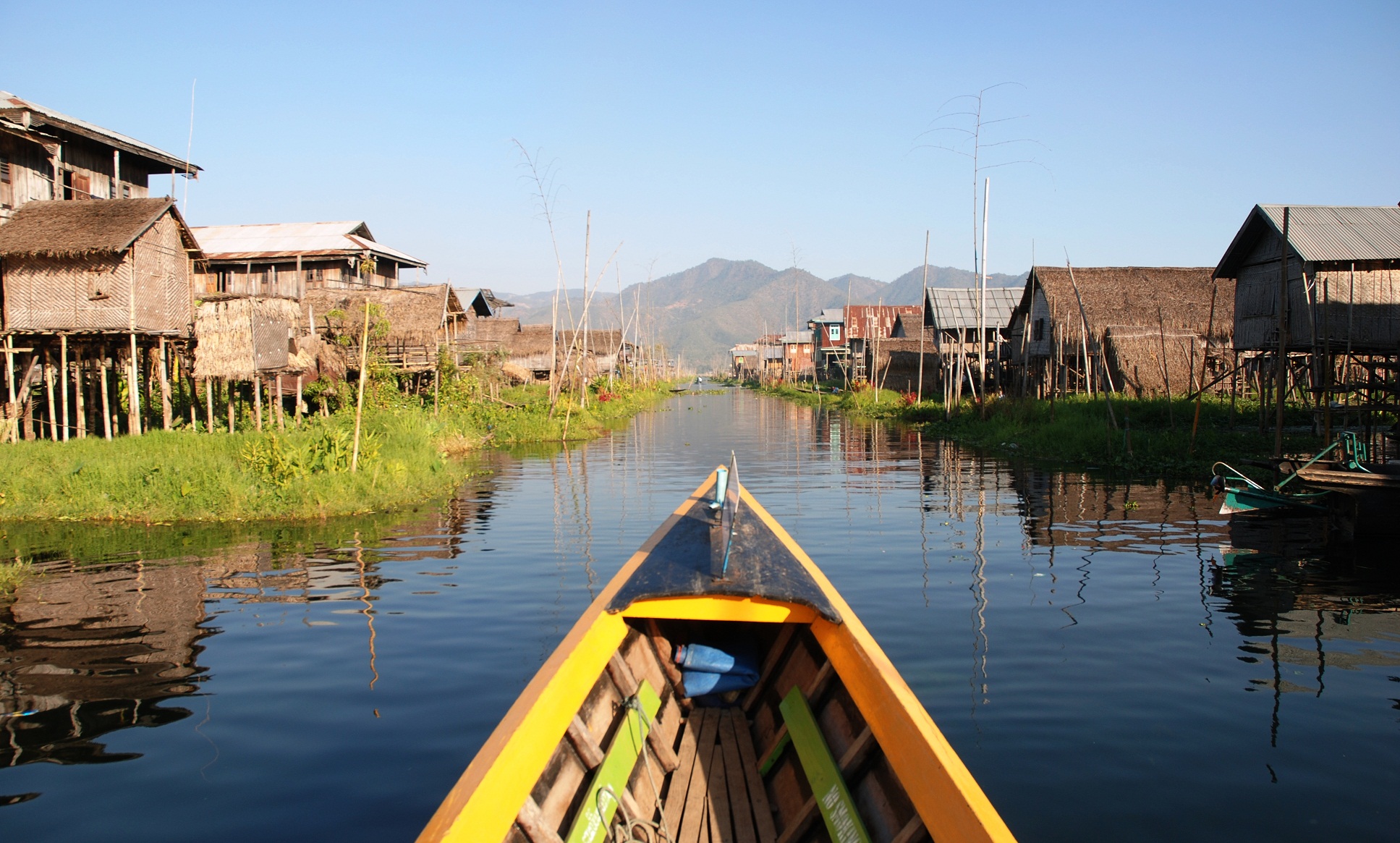
Explore Inle Lake on a boat
Inle Lake is one of the major tourist attractions in Myanmar. This is a place like no other – almost a world unto itself. It attracts travelers to witness its natural landscapes and cultural sights, then lures them to stay with its atmospheric beauty. The mirror-like surface of the water and the way it reflects and mingles with the sky give a surreal feel to the place. Further in, the lake is home to floating villages, markets, and gardens which make this place truly enchanting. There are some 70,000 of Inle Lake's inhabitants (called Intha) live in four cities bordering the lake, in numerous small villages along the lake's shores, and on the lake. Boats are the only means of transport, winding through narrow waterways lined with floating gardens. While a day tour cruising is a valid way to visit for those short on time, spend a few more and you can explore deep into the heart of the unique lifestyle of Intha people and soak up the splendor of the surrounding Shan hills. And of course, there are the famous Intha rowers with their unique “stand-on-one-leg-row-with-the-other” technique.
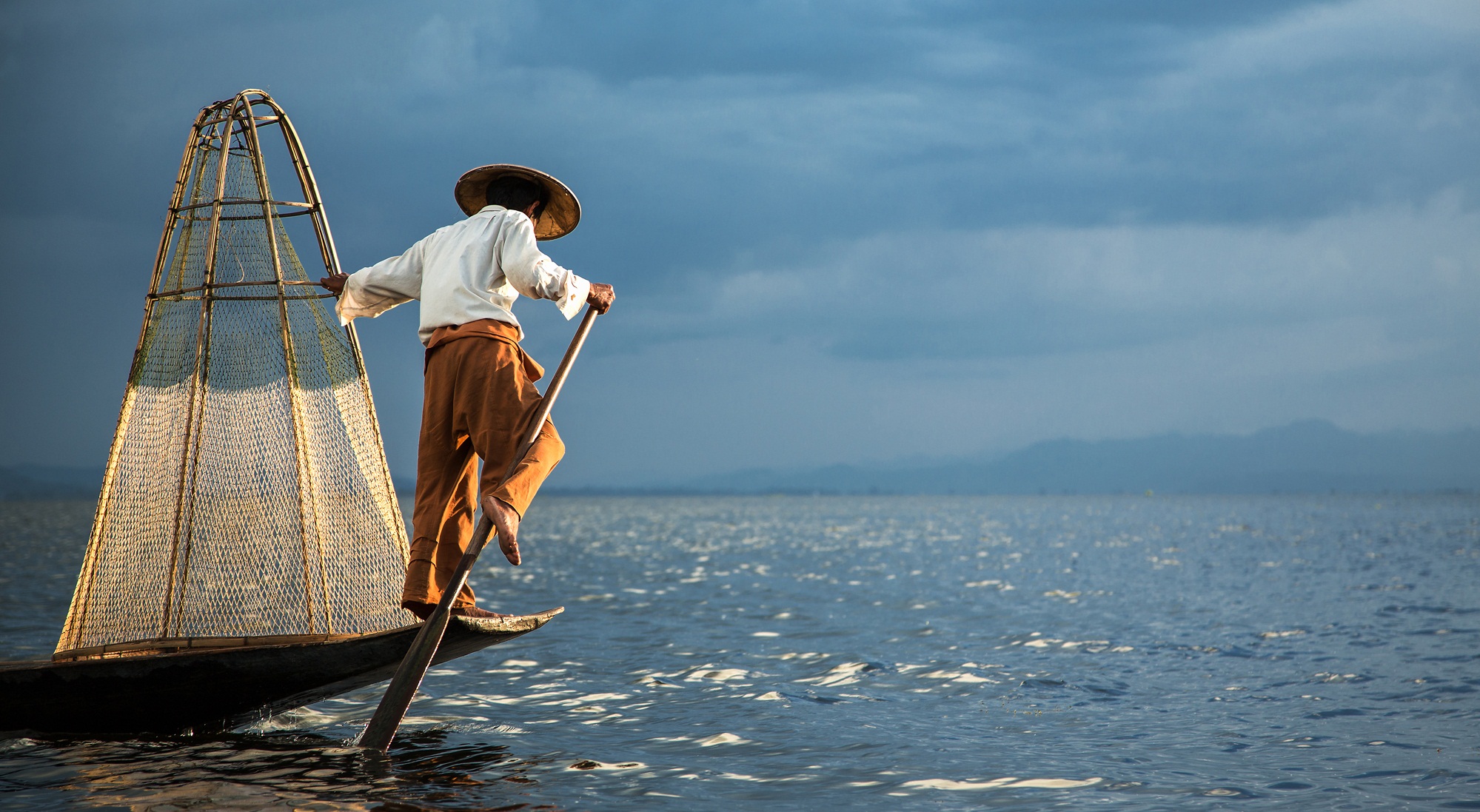
Intha leg rowers have fished this way for generations
How To Travel To Myanmar
In general, most foreign nationals require an advance visa to enter Myanmar. Citizens of Brunei, Cambodia, the Philippines, Indonesia, Laos, Vietnam, and Thailand (only via the international airports) are permitted to enter without a visa for a period not longer than 14 days.
By Air
Yangon International Airport (sometimes call Yangon Mingaladon Airport) is the primary entry point for most travelers, although Mandalay International Airport offers an increasing number of connections. The capital, Naypyidaw, also offers some direct international flights.
Currently, there is a limited number of international flights that connect Myanmar with destinations in Asia like Bangkok, Chiang Mai (Thailand), Kunming (China), Dhakka (Bangladesh), Singapore, Kuala Lumpur (Malaysia), HongKong, Taipei (Taiwan), Hanoi, Ho Chi Minh City (Vietnam)…
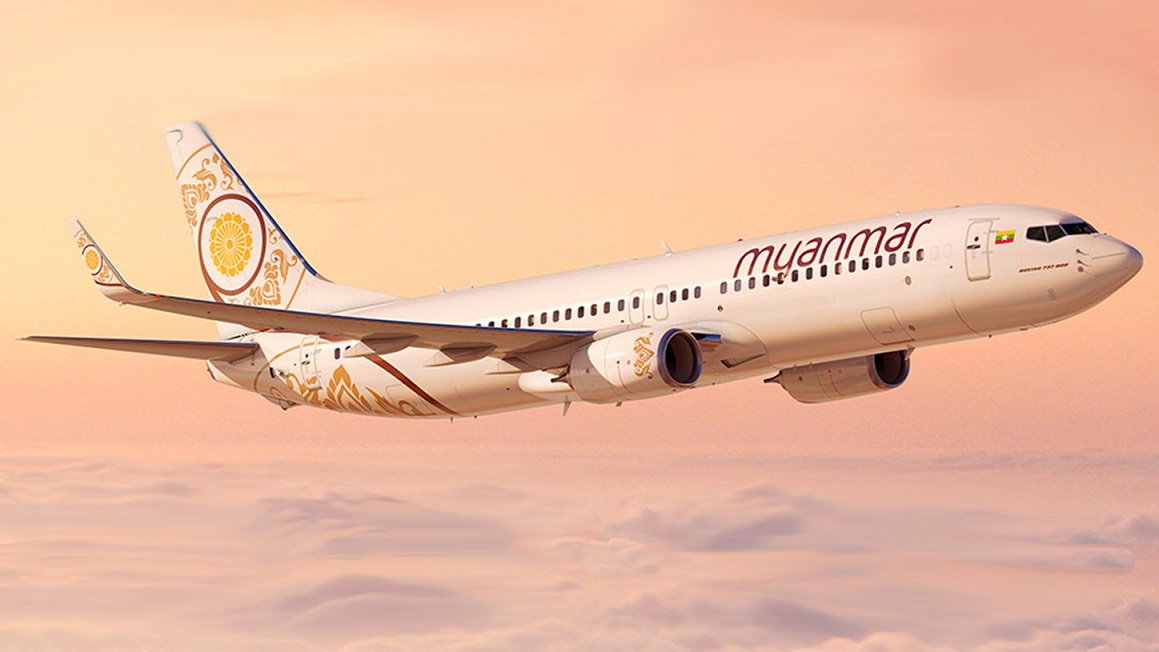
Myanmar Airlines
Overland
Entering Myanmar over land can be difficult to do, but not impossible. Traveling to Myanmar overland is possible, but generally not advised for those who might be put off by long delays, sudden closures of border crossings to foreigners, or changes in paperwork requirements - all of which may involve turning around and making alternative travel arrangements at the last minute. At present, it is only possible to travel freely over land between Myanmar and Thailand. The China crossing (at Ruili, Yunnan Province) and the India crossing (at Moreh, Manipur State) both require a permit. Crossing to Bangladesh is not currently permitted for foreigners and Laos has no official border crossing (although one is expected to open in late 2015).
Four Thai/Myanmar border points (including Mae Sot/Myawaddy; Mae Sai/Tachileik, Phunaron (for Kanchanaburi)/Htee Kee, Ranong/Kawthaung) are now officially open to foreigners for through travel, and Thailand offers visa-free travel for the citizens of many countries; the length of the stay period depends on what country you are from – varying from 14 days to 3 months.
Crossing into Myanmar with your own vehicle (motorhome, car, or motorbike) requires special permission and you will have to be accompanied by a guide and sometimes a Ministry of Hotels and Tourism liaison officer.
You might want to read more: How to travel to Myanmar
Myanmar Visa
If you have your visa ready and a valid passport with at least six months of validity from the time of entry in hand, you should have no trouble entering Myanmar either by air or land.
There is no requirement for you to show an onward ticket out of the country in order to enter Myanmar. Note that Myanmar doesn't recognize dual nationalities.
You should apply for your visa at a Burmese embassy or consulate abroad before you arrive in Myanmar. In Myanmar, you will be required to show your passport with a valid visa at all airports, train stations, and hotels. Security checkpoints are common outside of tourist areas.
On the basis of reciprocity, nationals of Brunei, Cambodia, Indonesia, Laos, Philippines, Thailand (by air only), and Vietnam do not require a visa to enter Myanmar for visits up to 14 days.
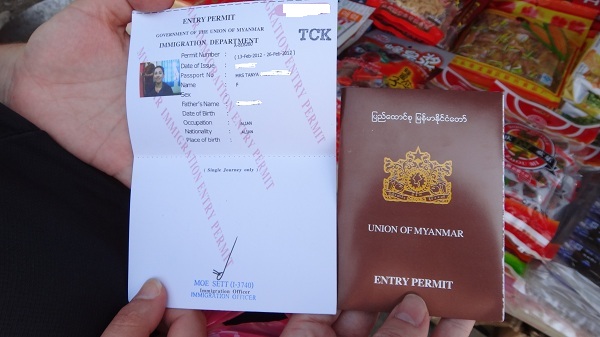
Union Of Myanmar Entry Permit
On September 1st, 2014, the Government of Myanmar announced an e-Visa program for tourist visas. The program allows tourists to apply for a visa online rather than physically applying at an embassy or consulate. Tourists are generally notified within a few days about whether they have been approved for a visa. You must present the approval letter at Immigration when you enter the country. Once tourists are approved for the visa, the visa needs to be used within three months.
Visa on arrival may be available for citizens from 48 countries if flying into Yangon International Airport or Mandalay International Airport. However, some travel sites are claiming that the Visa on arrival is either no longer available or not reliable.
Myanmar Airways claims that nationals of all countries and jurisdictions may obtain a tourist visa on arrival valid for 28 days provided they are arriving at Yangon International Airport on a specific flight on Myanmar Airways International from Guangzhou, though this seems to conflict with the Myanmar Visa on Arrival requirements.
Myanmar Currency
The Burmese kyat (pronounced ‘chat’) is the official currency of Myanmar. The Myanmar kyat is made up of 100 pyas and is often presented with the symbol K or MMK. Pya coins are very rare, but notes up to 1,000 kyat are commonly used.
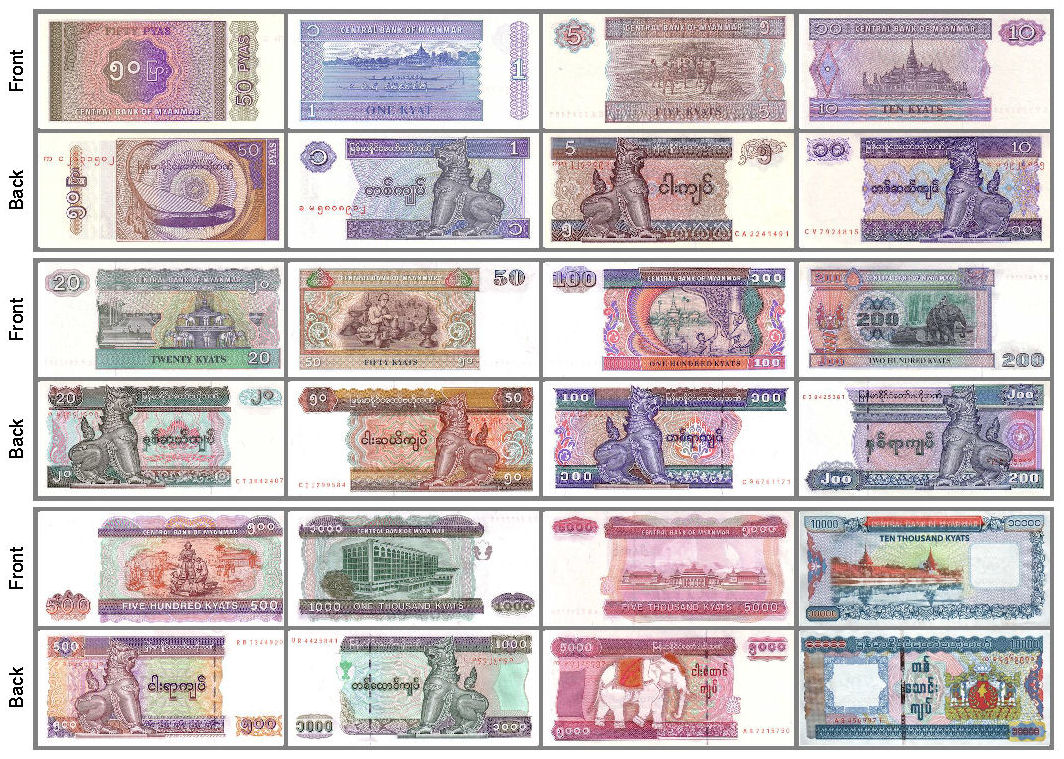
Burmese Kyat
The US dollar, however, is widely used as an alternative currency, particularly for larger purchases: foreigners are sometimes expected to pay in dollars for hotels, high-end restaurants, flights, and access to historical sites. The acceptable exchange rate is 1300 kyat = 1 USD. If payment is made in kyat for these transactions, it may sometimes be at a worse rate. When paying in dollars, change will often be given in kyat. Smaller purchases, such as taxi rides, buses, and cheaper to mid-range meals are quoted and are almost always paid for in kyat.
Blemishes of any kind – creases, marks, folds, and so on – may result in getting a far worse rate of exchange, or the money may not be accepted at all. Although the Myanmar government has recently told the banks to accept more than just the most pristine of foreign currency, bills that are not perfect may still be rejected or exchanged at a lower rate. The best places to exchange are at the airport and the banks. They offer the best rates and the security that you'll get what you should be getting. You can also exchange money at your guesthouse or local jewelry shops, though the rate will likely be poorer (30 kyat/dollar less is fair) than what you would get at the bank. Do not exchange money on the streets. This is a great way to get scammed, particularly in Yangon where the shady money changers often hang out near Sule Pagoda or the main Bogyoke Market.
While visitors once had to bring in all the necessary cash for their travels into Myanmar, there are now over 600 ATMs that accept international bank and credit cards located throughout the country – although bear in mind that most are concentrated in Yangon, Mandalay, Nay Pyi Taw, Bagan and Inle Lake. Cardholders can also withdraw local currency from ATMs and use their cards at a growing number of major outlets such as hotels, restaurants, and retailers.
Currently, only Visa, Mastercard (Maestro/Cirrus), China’s Union Pay, and Japan’s JCB can be used; the biggest providers of compatible ATMs are CB (Co-operative) Bank and KBZ (Kanbawza) Bank. Others include AGD Bank, AYA Bank, and United Amara Bank.
For ATM cash withdrawals, there is a 5000 Kyats transaction fee and a withdrawal limit of 300,000 Kyats per transaction. Depending on the conditions set by your own bank at home, you may be allowed multiple withdrawals per day. The use of ATMs in Myanmar is sometimes restricted by internet failure.
There are no international banks in Myanmar at the moment, and local banks are in the process of becoming part of the international banking system.
What To Pack To Myanmar
Knowing what to bring and what to leave at home will not only soothe away a lot of anxiety, it will also keep you ready to go and your bag light. Packing light is generally a good idea when hitting the road. Of course, every traveler has his own needs so consider your own comfort thresholds when packing your bag. So here are a few key considerations when packing for a trip to Myanmar.
- Myanmar can get quite hot and humid, which may encourage some Westerners to bring out their tanks and shorts. However, it is important to remember that Myanmar is a Buddhist country that is quite conservative when it comes to clothing. This is especially true when visiting temples. Men should also dress respectfully by wearing long pants that cover the knees. Women should pack clothing that will cover their shoulders, chests, and knees. Balancing modesty with the heat may be difficult, but dressing conservatively will show respect for local norms. If you can bear it, stay away from jeans. They absorb dirt (and odors), are bulky, and take days to air dry. Cotton and khaki are the way to go. The rainy season is from May through October, so bring an umbrella or raincoat if visiting during those months.
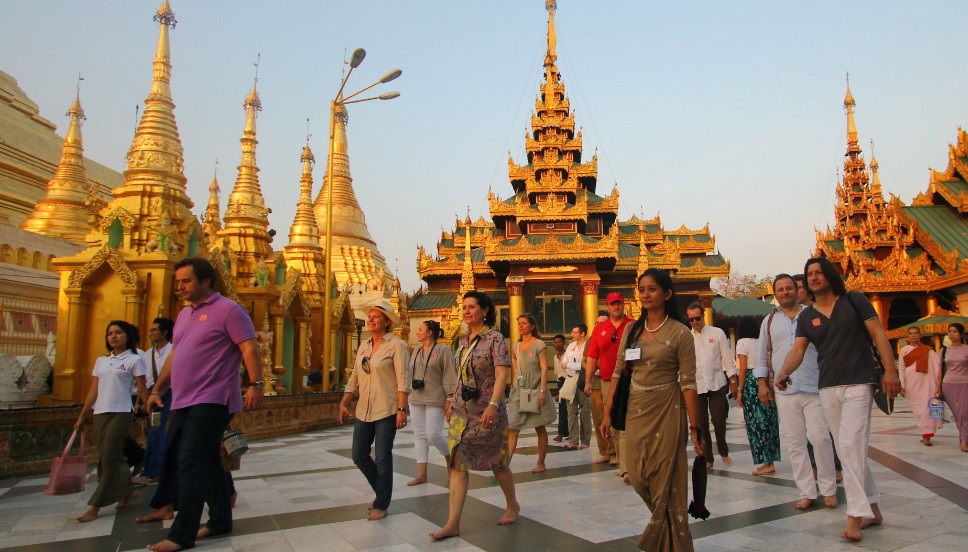
Please dress modestly to religious sites
- Leave your jewelry at home.
- Myanmar is a high-risk Malaria country so make sure you take insect repellent with you. Forget about smelling nice. Perfume is not a good idea. Not only will you get so hot you won’t smell it but you’ll also a calling card for every mosquito in the area to take a bite of your perfumed flesh.
- Dehydration is a health risk in this part of the world, so always carry a bottle of water with you.
- Have a small first aid kit that fits neatly in your backpack in case of emergencies.
- There are virtually no ATMs in Myanmar and very few establishments accept credit cards. Bring perfectly pristine bills (preferably US$100 bills). Any bills with folds or creases will be rejected or exchanged at a lower rate. Putting bills between two pieces of cardboard or thin plastic will help keep them pristine and usable. Also, keeping your money close to your body in a money belt is a good idea to help keep your notes safe from theft.
- If you like taking pictures, make sure you bring enough memory cards and a spare battery. Sometimes it may not be possible to charge all your electricals if there is a limited power supply so bring a backup battery to keep you going. No hotels or hostels have safety deposit boxes – so please bear this in mind when taking technical equipment or expensive cameras. Unless you want to risk leaving them in your room you are forced to carry them with you all the time.
Find more thing to pack to Myanmar
A trip to Myanmar is beyond incredible and surprising. As with all countries, Myanmar has its own set of unique cultural traditions and idiosyncrasies. Some of these are fascinating; some require sensitivity; some require the visitor to adjust. But above all they combine to make a nation that is as warm and welcoming as any in the world: locals are almost always keen to help out and make friends.
Xuyen
(Images source: Internet)
